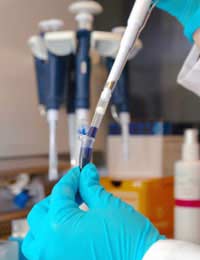Pre-Implantation Genetic Screening for Aneuploidy (PGS)

Pre-implantation genetic screening (PGS) also known as aneuploidy screening is a screening test for detecting chromosomal abnormalities in the developing embryo. This special procedure helps the fertility doctor select only those embryos which exhibit no chromosomal abnormalities and transfer them to the uterus for implantation. Aneuploidy is an abnormal condition where there are variations in chromosome number. These changes can lead to the development of genetic diseases or defects which are often permanent and cannot be reversed. Conditions such as Down’s syndrome, Kleinfelter's Syndrome disease, or Turner’s syndrome are among the many genetic diseases due to aneuploidy.
When undergoing fertility treatments and procedures it is highly recommended to screen for such chromosomal abnormalities so that the health and the future wellbeing of the developing embryo is not compromised. Pre-implantation genetic screening is offered to patients who are undergoing In-vitro fertilisation and other assisted reproductive techniques. Aneuploidy is the general term for the chromosome abnormality; the specific type of abnormality is further defined as (trisomy) three of the same chromosomes, or monosomy (single) chromosome. Normally the developing embryo acquires half their chromosomes from the maternal parent and the other half from the paternal parent. Both the sperm and the egg contain 23 chromosomes. When they fuse together, the chromosomes mix together. During the process of cell division, the chromosomes double and the cell split into two. In rare instances the chromosomes don’t split evenly and there is an extra chromosome in one cell. This cell continues to divide caring with it the extra chromosome and thus the genetic defect. Maternal Age plays a key role in chromosomal abnormalities, Women older than 35 are at a greater risk for developing chromosomal abnormalities than the rest of the female population. This risk is increased from 1/1500 to about 1/500 after the age of 35. Although 1/500 may still seem small, it does translate to a 3-fold increase.
The Pre-implantation Genetic Diagnosis (PGD) is another technique similar to genetic screening but in this process the embryos are tested for specific genetic diseases. The common genetic diagnosis includes Down’s syndrome, Kleinfelter's, Edwards Syndrome and a few others. Aneuploidy screening, and pre-implantation diagnosis reduces the chances of transferring the embryo that has a chromosome abnormality.
Miscarriages are also caused by chromosomal abnormalities. The human body is sensitive to subtle genetic changes and this signals the natural abortive process. The most common chromosome abnormalities in miscarriages include: trisomy (3 copies of a chromosome) or monosomy (one copy of a chromosome) for chromosomes 13, 15, 16, 18, 21, or 22; triploidy (3 copies of all the chromosomes); and abnormalities of the sex chromosomes.
Usually, Pre- implantation genetic screening is preformed by obtaining a biopsy on the third day post fertilisation. After the embryos are created in the laboratory and they are grown for 3 days, 1 or 2 cells are removed from the embryo. The genetic material, mainly the chromosome inside these cells is tested for abnormalities. Embryos having both a normal test result and physical appearance should be transferred to have the highest chance of leading into a healthy pregnancy. Physical appearance means embryos should have at least 5 cells on day 3.
Pre implantation genetic screening is advised for couples that, under go ART, have a family history of genetic disorders, or who have repeated unexplained miscarriages. This screening is also advised for women with advanced maternal age because the risk of such defects increases with age especially after 35.
- What is Clomid?
- Crisis in UK Fertility Treatment
- Preventing IVF Mix Ups
- Ovary Transplants: Are They Possible?
- Tips on Improving Sperm Count
- Intrauterine Insemination
- IVF Clinic Costs
- Donor Insemination
- IVF Secrets Fertility Guide
- What Support is Available for Fertility Patients?
- Pre-Implantation Genetic Diagnosis
- Understanding Fertility Test Results
- Intra-Cytoplasmic Sperm Insemination (ICSI)
- How Long Will Treatment Take?
- Gamete Intra-Fallopian Transfer with Donor Sperm
- Aiding Conception During Treatment
- Gamete Intra-Fallopian Transfer with Donor Eggs
- Drug Therapies
- Embryo Freezing
- In Vitro Fertilisation (IVF)


Re: What Causes Sperm Loss?
Kak esehiko sminor k112 fertilityexpert.co.uk
Re: What Causes Sperm Loss?
antiquities. These are the Egyptian papyri
Re: What Causes Sperm Loss?
from lat. manus - "hand" and scribo - "I write") ]
Re: Ovary Transplants: Are They Possible?
Hi! I 37 years old single mather. I was ovary gonadoblastoma in 2013. Removed both ovaryes . I take hormon pills but…
Re: Ovary Transplants: Are They Possible?
I am a 54 year old women who went through an early menopause. Since then I have developed all sorts of issues which I…
Re: Ovary Transplants: Are They Possible?
I have pcos with it cure it if I have this done
Re: Ovary Transplants: Are They Possible?
We are from India and my wife got pregnant through IVF treatment, now she is in her 17th week of pregnancy. We have…
Re: Ovary Transplants: Are They Possible?
Janaka - Your Question:Hi everyone,My wife 28 years old, her both ovaries removed due to cyst after that she is facing…
Re: Ovary Transplants: Are They Possible?
Hi everyone, My wife 28 years old, her both ovaries removed due to cyst after that she is facing lot's lot's of…
Re: What Causes Sperm Loss?
I'm seeing only watered with little amount of white colour when it come out from my anus .wt is ur suggestions for this . please send reply.